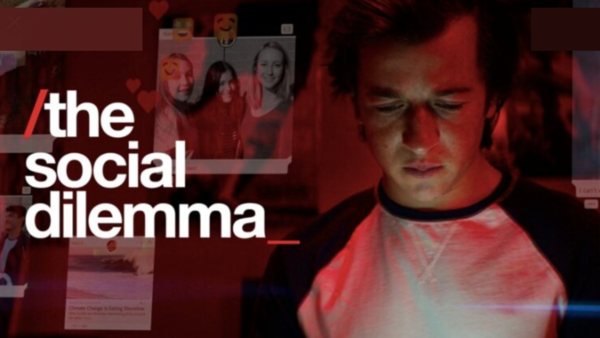By Pastor Andrews - Jan 19, 2021 #culture #fatherhood #parenting
Movie Review: “The Social Dilemma”

Think of the following not as you typical movie review—but more of a plea to parents to be on high alert regarding their children’s social media interaction. If you’re a dad, I recommend you watch “The Social Dilemma,” a Netflix docudrama by Jeff Orlowski that reveals the incredible, intentional effort by social media platforms to addict and exploit you and your kids.
The most powerful thing about this film is that the whistle-blowers are the same people who helped create the problem: former executives of Google, Twitter, Instagram, Facebook and Pinterest, whose crisis of conscience drove them to speak out. While there have been numerous documentaries raising red flags about the impact of social media on privacy and moral issues, “The Social Dilemma” is getting the most attention and, in my opinion, is very well done. The New York Times said the film is “remarkably effective in sounding the alarm about the incursion of data mining and manipulative technology into our social lives and beyond.”
The underlying warning is simple: “If you’re not paying for it, you’re the product.” What this means is that “free” social media apps do have a cost. They use persuasive design to keep you glued to your device, collecting mountains of behavioral data that they use to get you even more addicted. You become a conditioned, marketable product that can be sold to advertisers, because they can accurately predict what will grab your attention. As a former Google exec said, “Social media isn’t a tool that’s waiting to be used. It has its own goals and it has its own means of pursuing them by using your psychology against you.”
Here are three major concerns the film raises for any user of social media:
1. It creates a distorted view of self
Gen Z (those born after 1996) are the first generation to be introduced to social media as middle schoolers. In the film, NYU professor and psychologist Jonathan Haidt observes a “gigantic increase” in the incidence of anxiety and depression among pre-teen and teenage girls since 2011—which coincides with the rise of social media. According to the CDC, there was a 62% increase in girls aged 15-to-19 admitted to hospitals for self-harm, and 189% increase in 10-to-14 year-old girls.
“Even more horrifying, we see the same pattern with suicide,” Haidt said. “The older teen girls, 15-to-19 years old, they’re up 70% compared to the first decade of the century. The preteen girls, who have very low rates to begin with, they are up 151%. And that pattern points to social media.”
If you have ever felt a little down about not getting a post “liked” enough, consider what it’s like for middle- and high-schoolers whose self-esteem is hanging by a thread. More and more, they’re being conditioned to crave that little click of affirmation. Consider the horrible phenomenon of “snapchat dysmorphia”, in which young people seek plastic surgery to smooth out skin tones and change the shape of their facial features to look more like the photo filters offered on Snapchat and Instagram. According to the Washington Post, “Patients are desperate to resemble their doctored selfies.”
2. It inflames a polarized view of others
While the incredible political polarization we now see in our country didn’t start with social media, it certainly has poured gasoline on the fire. Social media feeds you information that reinforces your beliefs and ideologies to keep you engaged, and perhaps enraged. The level of hostility growing between party politics led one contributor to say his greatest fear is civil war. After what recently took place at the Capitol that doesn’t seem to be an exaggeration.
A similar pattern has happened with COVID. People regurgitate information received on social media that has been designed to polarize for the simple reason that it generates more time and attention, and therefore more income. Engagement algorithms have no conscience and could care less if people want to spread misinformation and conspiracy theories. Obviously, this is not the way civilized discourse should be. It actually shuts down communication and leaves you in your own little echo chamber.
3. Its sheer volume seems unstoppable
Almost half of the world’s population uses some type of social media platform. Sharing my personal apprehensions feels like bringing a BB gun to a nuclear war. It’s so big that any attempt to address the ethical conundrums feels just too little, too late. However, as a pastor, I have a responsibility to address what I believe is a threat to people’s lives, especially young lives. More importantly, you still have a choice.
* * *
The social media question that you need to answer honestly is, “Am I controlling it, or is it controlling me?” I hope parents who read this will be motivated to watch “The Social Dilemma” and that it would lead you to reevaluate your time on social media. And if you disagree with me and want to share your objections, feel free to give me a call. Let’s go analog and talk about it. But don’t hit me up on FB because I no longer have an account.